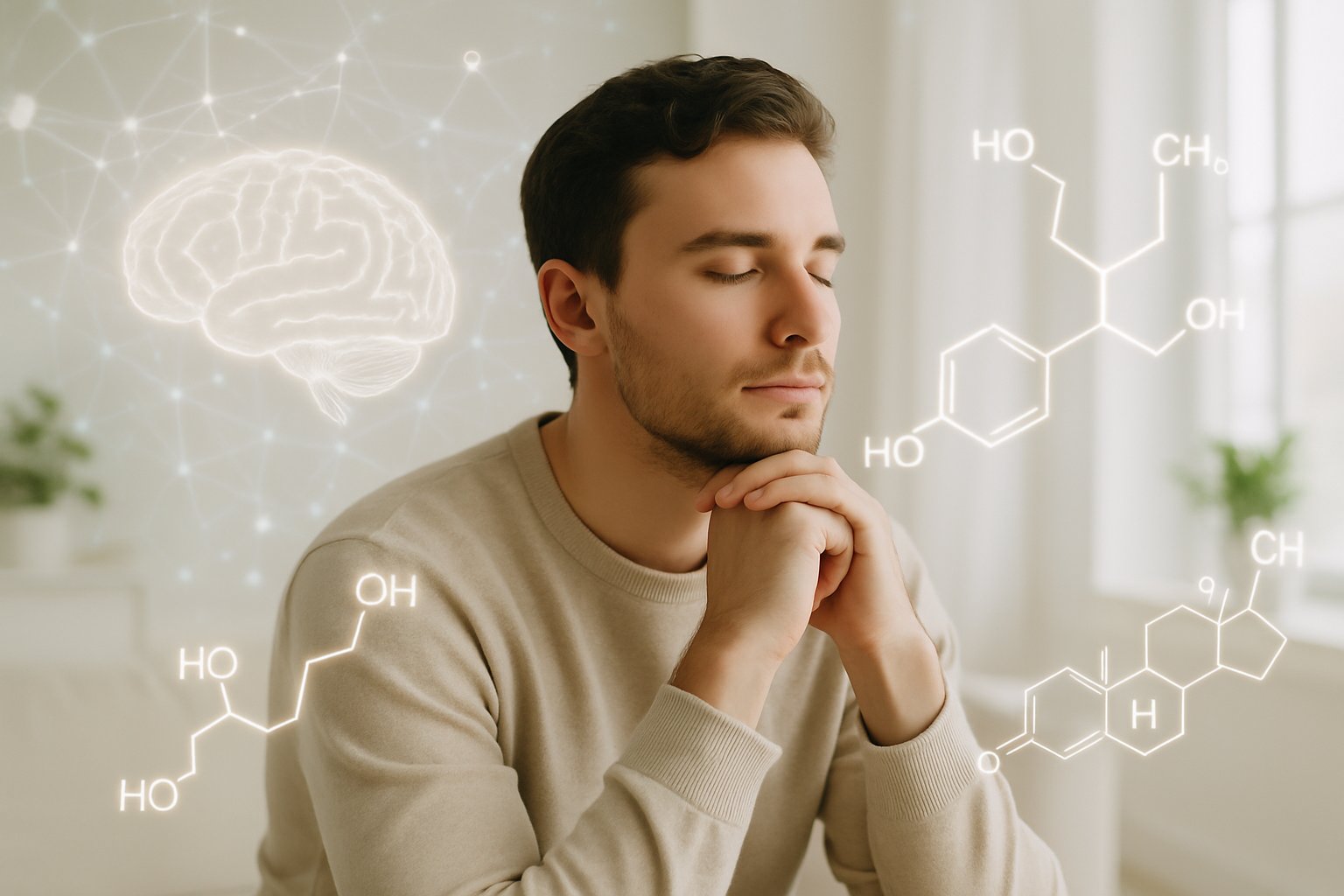Many people wonder about the effects of stopping masturbation on their physical and mental health. This practice has gained attention through movements like “No Fap” and “No Nut November,” leading to questions about what actually happens when someone abstains.

When someone stops masturbating, their body experiences changes in hormone levels, sleep patterns, stress responses, and sexual function, though the effects vary greatly between individuals. Research shows what happens to your body[1] when sexual stimulation is removed, affecting both men and women differently.
Understanding these changes helps people make informed decisions about their sexual health. The effects range from hormonal shifts to emotional changes, and knowing what to expect can help manage any concerns that arise during periods of abstinence.
Key Takeaways
- Stopping masturbation causes hormonal and physical changes that affect sleep, stress levels, and sexual function
- The body experiences both potential benefits like increased energy and risks like higher stress or sexual dysfunction
- Individual responses vary widely, and the effects on relationships and mental health depend on personal circumstances
Immediate Physical and Psychological Changes

When someone stops masturbating, their body and mind begin adjusting within the first few days to weeks. The most common changes include shifts in brain chemistry, heightened sexual energy, and disrupted sleep patterns.
Dopamine Withdrawal and Mood Swings
Masturbation releases dopamine, a brain chemical that creates feelings of pleasure and reward. When someone stops this activity, dopamine levels drop quickly.
This sudden change can cause mood swings in the first week. Many people feel irritable, anxious, or restless during this period.
Common dopamine withdrawal symptoms include:
- Increased irritability
- Difficulty concentrating
- Restlessness or fidgeting
- Mild depression or sadness
The brain typically adjusts to lower dopamine levels within 7-14 days. However, some people may experience these feelings for up to a month.
People who masturbated daily often notice the strongest withdrawal effects. Those who did it less frequently may have milder symptoms.
Increased Sexual Urges and Energy
Abstaining from masturbation often leads to stronger sexual urges within the first few days. The body continues producing hormones and building sexual tension without release.
Many people report feeling more energetic after quitting masturbation. This happens because sexual energy gets redirected to other activities.
Physical changes may include:
- Stronger erections (for men)
- Increased sensitivity to touch
- More frequent sexual thoughts
- Higher motivation for other tasks
Some individuals use this extra energy for exercise, work, or hobbies. The increased urges usually peak around day 3-7 before stabilizing.
Sleep Patterns and Fatigue
Effects of stopping masturbation[2] can include changes to sleep quality and energy levels. Many people used masturbation as a way to relax before bed.
Without this routine, falling asleep may become harder initially. The body needs time to develop new relaxation methods.
Sleep-related changes include:
- Difficulty falling asleep
- More restless nights
- Vivid dreams or nightmares
- Daytime fatigue from poor sleep
These sleep issues typically improve after 1-2 weeks. The body learns new ways to wind down without sexual release.
Some people find they sleep better after the adjustment period. They report feeling more rested and alert during the day.
Hormonal and Neurological Impacts

When someone stops masturbating, their body undergoes specific hormonal shifts and brain chemistry changes. Testosterone levels may rise temporarily, while oxytocin production patterns shift significantly.
Short-Term Testosterone Fluctuations
Testosterone levels typically increase when men stop masturbating for short periods. Research shows levels can rise by 45% after about seven days without ejaculation.
This boost usually peaks around day seven. After that, testosterone levels often return to normal ranges even if abstinence continues.
Key testosterone changes include:
- Initial rise in the first week
- Peak levels around day 7
- Return to baseline after 2-3 weeks
- No permanent changes to overall production
Women may also experience slight hormonal shifts. Their testosterone levels can increase modestly during periods without masturbation.
The temporary nature of these changes means the body adjusts its hormone production[3] over time. Long-term abstinence doesn’t lead to continuously rising testosterone levels.
Oxytocin and Brain Chemistry Adjustments
Oxytocin release patterns change when masturbation stops. This hormone normally increases during sexual activity and orgasm.
Without regular sexual release, the brain reduces its oxytocin output. This can affect mood and stress levels in some people.
Brain chemistry changes include:
- Reduced oxytocin production
- Altered dopamine reward pathways
- Changes in endorphin release patterns
- Modified stress hormone responses
Dopamine pathways also adjust when sexual behaviors change. The brain’s reward system adapts to the absence of regular sexual stimulation.
These neurological shifts typically stabilize within 2-4 weeks. Research shows the brain adapts[1] to new patterns of sexual activity or abstinence relatively quickly.
Sexual Health and Function

Stopping masturbation creates several changes in sexual health and body function. The body experiences shifts in sensitivity levels, potential erectile changes, and natural release mechanisms.
Sensitivity and Libido Changes
When someone stops masturbating, their body often becomes more sensitive to sexual touch. This happens because the genital area has time to reset its response to stimulation.
Increased sensitivity can lead to heightened pleasure[4] during sexual encounters with a partner. The body adjusts to receiving less frequent stimulation.
Common sensitivity changes include:
- More intense physical responses
- Quicker arousal during partnered activities
- Heightened awareness of touch
Libido changes vary from person to person. Some people notice stronger sexual desires after stopping. Others may feel their interest in sex decreases temporarily.
The brain’s reward system adjusts when regular masturbation stops. This can affect how someone thinks about and responds to sexual situations.
Potential for Erectile Dysfunction
Many people worry that stopping masturbation causes erectile problems. Research shows this concern is mostly unfounded.
Abstaining from masturbation does not lead to erectile dysfunction[4]. In fact, taking breaks may help some men improve their erectile function.
The body’s natural sexual response can reset during periods without masturbation. This may help men who have trouble with erections during partnered sex.
Factors that affect erectile function:
- Overall health and fitness
- Stress levels
- Sleep quality
- Relationship dynamics
Some men report better sexual performance after stopping masturbation. They may experience increased stamina and stronger erections during partnered activities.
Nocturnal Emissions and ‘Blue Balls’
When someone stops masturbating, the body still needs to release built-up sexual tension. This often happens through wet dreams or nocturnal emissions.
Wet dreams are completely normal and healthy. They allow the body to release sperm and sexual fluids naturally during sleep.
Blue balls refers to testicular discomfort from sexual arousal without release. This condition is temporary and not harmful to health.
The discomfort from blue balls typically goes away on its own within a few hours. Light physical activity or a cold shower can help reduce the sensation.
Nocturnal emissions become more common when someone stops regular masturbation. The frequency varies based on age, hormone levels, and individual body responses.
These natural processes show that the body adapts to changes in sexual habits without causing health problems.
Emotional and Mental Well-Being

Stopping masturbation can lead to significant changes in dopamine levels, which directly affects motivation and focus patterns. Many people also experience shifts in emotional stability and self-confidence during this adjustment period.
Changes in Motivation and Focus
When someone stops masturbating, their brain begins to adjust its dopamine response patterns. This neurotransmitter plays a key role in motivation and reward-seeking behavior.
Initial Effects:
- Decreased dopamine stimulation from sexual activity
- Temporary drops in motivation levels
- Difficulty concentrating on daily tasks
The brain typically takes several weeks to recalibrate its reward system. During this time, people may feel less driven to complete routine activities.
Some individuals report improved focus after the adjustment period ends. They find it easier to concentrate on work, hobbies, or personal goals without sexual distractions.
Common Focus Changes:
- Better attention span during conversations
- Increased ability to complete long-term projects
- Less mental preoccupation with sexual thoughts
Research shows various effects[4] when people quit masturbation, though individual experiences differ greatly.
Emotional Resilience and Self-Esteem
Quitting masturbation often creates emotional ups and downs as the body adjusts to new patterns. Some people experience mood swings during the first few weeks.
Potential Emotional Changes:
- Increased irritability or restlessness
- Higher stress levels without sexual release
- Mood fluctuations throughout the day
Many individuals report feeling more confident after successfully stopping masturbation. This boost in self-esteem often comes from achieving a personal goal.
The effects of stopping masturbation[2] include both positive and challenging emotional responses. People may feel more in control of their impulses.
Self-Esteem Benefits:
- Greater sense of self-discipline
- Improved body awareness
- Enhanced emotional regulation skills
Some people find they handle stress differently without masturbation as a coping mechanism. They often develop new healthy ways to manage difficult emotions and daily pressures.
Relationship and Social Dynamics

Stopping masturbation can affect how people connect with romantic partners and may influence participation in online communities focused on sexual abstinence. These changes impact both intimate relationships and broader social interactions around sexual health.
Impact on Intimacy and Partner Connection
When someone stops masturbating, they may experience changes in their romantic relationships. Some people report feeling more connected to their partner because they focus sexual energy on shared intimacy rather than solo activities.
Increased Partner Focus People who stop masturbating often redirect their sexual attention toward their romantic partner. This can lead to more frequent intimate conversations and physical connection.
Communication Changes Partners may need to discuss the decision to stop masturbating. Open talks about sexual needs become more important when one person makes this choice.
Potential Challenges Some individuals might experience increased sexual tension or frustration. This can affect mood and patience in relationships if not managed well.
Intimacy Patterns Couples may notice changes in their sexual routine. Some report improved satisfaction with partnered activities, while others may struggle with unmet needs.
Managing Porn Addiction and NoFap Movement
The NoFap movement encourages people to abstain from masturbation and pornography[1]. Many participants join online communities for support and accountability.
NoFap Community Support Online forums provide encouragement for people trying to stop masturbating. Members share experiences and coping strategies for managing urges.
Porn Addiction Recovery Some people stop masturbating as part of addressing porn addiction. This approach aims to reset sexual responses and reduce dependence on visual stimulation.
Social Accountability Many participants track their progress and share milestones with online communities. This social aspect helps some people maintain their goals.
Varied Results Individual experiences with NoFap differ widely. Some report improved confidence and relationships, while others find the approach too restrictive or unhelpful.
Potential Benefits and Risks of Abstaining

Stopping masturbation can lead to both positive changes and potential drawbacks for different people. The effects of stopping masturbation[4] vary based on individual habits and health factors.
Improved Self-Control and Discipline
People who stop masturbating often develop stronger willpower in other areas of life. This practice requires daily self-discipline that can transfer to work, exercise, and personal goals.
Many individuals report increased focus and productivity[4] after abstaining. Without the distraction of sexual urges, they can direct more energy toward important tasks.
Mental benefits may include:
- Better concentration during work or study
- Stronger ability to resist temptations
- Increased motivation for challenging activities
- Greater sense of personal achievement
Some people notice improved mood and emotional stability. The self-control needed to abstain can boost confidence and self-respect over time.
Possible Drawbacks and Myths about Excessive Masturbation
Several myths exist about stopping masturbation that create unnecessary worry. Abstaining does not lead to prostate problems[4] or cause infertility in healthy men.
Common myths include:
- Stopping causes erectile dysfunction (false)
- Not masturbating leads to prostate cancer (no evidence)
- Abstaining makes people infertile (untrue)
- Sexual frustration becomes permanent (temporary)
Real drawbacks can occur for some people. Experts warn that going too long without sexual activity[5] may cause temporary mental health issues.
Potential negative effects include increased stress, sleep problems, and sexual tension. Some people experience mood swings or irritability during the adjustment period.
Comparing Benefits of Masturbation vs. Abstaining
Regular masturbation provides proven health benefits that abstaining removes. These include stress relief, better sleep, pain reduction, and prostate health maintenance through regular ejaculation.
Benefits of masturbation:
- Releases tension and reduces anxiety
- Helps people fall asleep faster
- Provides natural pain relief
- May lower prostate cancer risk
- Improves understanding of sexual preferences
Benefits of abstaining:
- Enhanced sexual sensitivity[4] with partners
- Possible improved sexual performance
- Stronger self-discipline
- More time for other activities
The choice depends on individual goals and current habits. People with excessive masturbation habits may benefit more from temporary breaks than those with moderate, healthy patterns.
Neither approach is universally better. Both masturbation and abstaining can be healthy choices when practiced in moderation and without guilt or obsession.
Frequently Asked Questions

People who stop masturbating often experience changes in their body and mind. These changes can affect hormone levels, sleep, mood, and physical health in different ways.
What physical changes might occur after ceasing regular masturbation?
The body may experience several physical changes when someone stops masturbating regularly. Blood flow patterns in the genital area can shift since there’s less frequent stimulation.
Some people notice changes in their skin condition. Others report different energy levels throughout the day.
Muscle tension might increase in some areas of the body. The pelvic floor muscles may feel tighter without regular release.
Sleep patterns can shift as the body adjusts to new hormone cycles. Some people feel more restless at first.
Are there psychological effects associated with stopping masturbation?
Mental changes often happen when people stop masturbating. Stress levels might increase since masturbation normally helps release tension.
Mood swings can become more common. Some people feel more irritable or anxious than usual.
Focus and concentration might change. Research shows what happens to your body[1] when sexual stimulation stops completely.
Self-control can improve over time. Many people report feeling more disciplined in other areas of life.
How does cessation from masturbation impact testosterone levels?
Testosterone levels can change when someone stops masturbating. In the short term, levels might rise slightly.
After about a week, testosterone often returns to normal levels. The body adjusts its hormone production naturally.
Some studies show small increases in testosterone after stopping. But these changes are usually temporary.
Long-term testosterone levels typically stay within normal ranges. The body maintains its natural balance over time.
Can abstaining from sexual release affect sleep patterns or quality?
Sleep can change when people stop masturbating regularly. Many people use masturbation to help them fall asleep.
Without this routine, falling asleep might take longer. The body needs time to find new ways to relax at bedtime.
Sleep quality might decrease at first. Some people experience more restless nights or vivid dreams.
Over time, most people develop new sleep habits. The body adapts to different ways of preparing for rest.
Is there a correlation between not masturbating and energy levels or mood?
Energy levels often change when someone stops masturbating. Some people report feeling more energetic during the day.
Others feel more tired or sluggish at first. The body needs time to adjust to new patterns.
Mood changes are common in the beginning. Experts have outlined changes that happen to your body[2] when you stop masturbating.
Many people experience mood swings or increased irritability. These feelings usually improve after a few weeks.
What are potential long-term outcomes of discontinuing frequent ejaculation?
Long-term effects vary from person to person. Some people maintain their decision to stop permanently.
Prostate health might be affected by less frequent ejaculation. Regular ejaculation may help reduce prostate cancer risk.
Sexual function typically remains normal. The body maintains its ability to respond sexually.
Mental health outcomes depend on individual circumstances. Some people feel better while others prefer returning to their previous habits.
References
- Shocking research shows what happens to your body if you stop masturbating forever. https://www.unilad.com/news/health/what-happens-body-stop-masturbating-491054-20250518 Accessed October 21, 2025
- Everything that happens to your body if you stop masturbating. https://www.tyla.com/life/sex-and-relationships/what-happens-stop-masturbating-body-health-impacts-962354-20250904 Accessed October 21, 2025
- Physical and psychological effects behind not masturbating as 'health benefits' explained. https://www.ladbible.com/news/health/health-benefits-not-masturbating-explained-doctor-frequency-774938-20250714 Accessed October 21, 2025
- What Will Happen If I Stop Masturbating. https://statcarewalkin.com/info/what-will-happen-if-i-stop-masturbating-effects-benefits-myths-debunked.html Accessed October 21, 2025
- What Happens To Your Body When You Stop Having Sex Or Masturbating For Months. https://thoughtnova.com/what-happens-to-your-body-when-you-stop-having-sex-or-masturbating-for-months Accessed October 21, 2025
